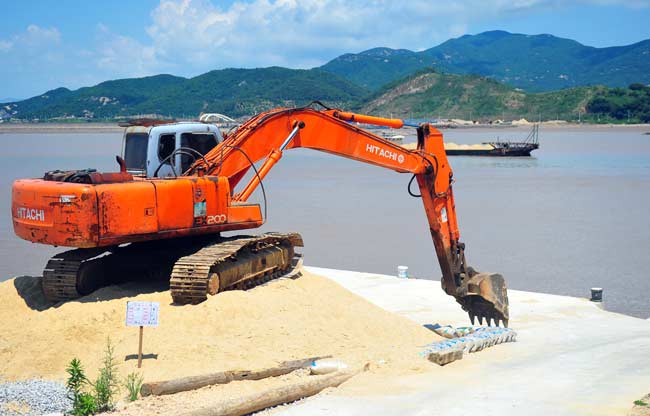

An excavator working on the latest development on Dayangyu Island on Aug 7. PHOTO BY SHI XIAOFENG / CHINA DAILY
Government dilemma
China has more than 6,900 islands that are larger than 500 sq m and 90 percent of them are uninhabited.
Among the first batch of 176 uninhabited islands approved for private development, 31 are in Zhejiang. But of those, only Dayangyu Island has been leased out.
Developing these islands can also be a challenge for local governments. On the one hand, they want to attract investment to the islands. One the other hand, their strict rules toward such development scare investors away.
Yu Mingquan, deputy director of the Xiangshan ocean and fisheries bureau, said that although the county has the largest number of uninhabited islands in the province, only two of them have their ownerships leased out.
"I receive phone calls every day on queries about purchasing island ownerships. But very few of them have clear ideas of what they want to do with the island," he said.
Yu said that the county has strict regulations on developing these islands.
"The owners should have clear plans about developing the islands, and those in turn must meet our plan for the whole area. We will not approve ownership if someone merely wants to have an island and build something of their own," he said.
If an island is leased out but does not develop in three years, the local government has the right to take it back, Yu said.
"We are not offering the islands for personal use. Our hope is to use private capital to develop these islands, but they have to keep the original shape of the islands," he said.
Protection is the top priority for the uninhabited islands, Yu said. Only investors with a well-balanced protection and development plan can be considered for the leases, he said.
Cui Wanglai, a professor with Zhejiang Ocean University who studies the development of uninhabited islands, said that apart from natural factors, the biggest problem for private investors developing these islands is poor access.
"Dayangyu Island was taken because it is only several hundred meters away from the mainland. Electricity, telecommunication cables and clean water pipelines can be easily connected. But some islands are thousands of meters away, which make costs much higher," he said.
Currently, most uninhabited islands in China lack basic facilities, including docks, electricity, water and telecommunication cables. Setting up these facilities on the islands can cost up to 10 times that on the mainland, Cui said.
"Local governments also have strict rules for developing these islands. Businessmen are not willing to spend large investments under such strictly limited development," he said.
The caution expressed by local governments spring from the awareness of the damage by overdevelopment in the past two decades.
The occupation and use of uninhabited islands were in mess before the country released the Island Protection Law in 2010, Cui said.
Among the more than 9,600 such islands in China, more than 3,000 of them have been occupied or developed at different stages, he said. Many illegal developers destroyed the ecology of the islands.
By 2010, 220 islands in Zhejiang province were destroyed, with 207 of them caused by overdevelopment, Cui said.
"With national attention on protecting these islands, authorities are very cautious about leasing them out," he said.
Fujian, a coastal province in China, has identified 20 uninhabited islands that can be leased for up to 50 years to global tourism investors, under very stringent conditions.
Bidders are required to invest at least 500 million yuan on each island with annual investment reaching 50 million yuan, according to the Fujian Provincial Department of Ocean and Fisheries. Construction should start the year after contracts are signed and infrastructure projects, including ports and buildings, should be completed within three years.
Ni Dingkang, deputy manager of Zhoushan Islands Development Investment Co, said that government support is essential to further develop these islands.
The former official at the Zhoushan Ocean and Fisheries Bureau said that local authorities can help investors build infrastructure in advance to both relieve investors' burden and protect the island ecology.
"Private investment can increase substantially if the government can help reduce the costs of developing the uninhabited islands," he said.
South China islands see green transformation
2014-07-30All Xisha‘s inhabited islands now have passages
2014-07-23Copyright ©1999-2018
Chinanews.com. All rights reserved.
Reproduction in whole or in part without permission is prohibited.